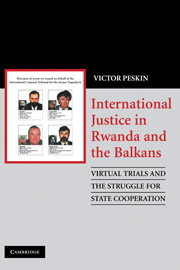Description
International Justice in Rwanda and the Balkans
Virtual Trials and the Struggle for State Cooperation
Author: Peskin Victor
This book investigates how the UN International Criminal Court pressures states to hand over their own leaders for trial.
Language: English
Subject for International Justice in Rwanda and the Balkans:
Approximative price 100.60 €
Subject to availability at the publisher.
Add to cart
International justice in rwanda and the balkans: virtual trials and the struggle for state cooperation
Publication date: 03-2008
296 p. · 16.1x24 cm
Publication date: 03-2008
296 p. · 16.1x24 cm
Approximative price 30.20 €
Subject to availability at the publisher.
Add to cart
International justice in rwanda and the balkans: virtual trials and the struggle for state cooperation
Publication date: 06-2009
296 p. · 15.5x23.5 cm · Paperback
Publication date: 06-2009
296 p. · 15.5x23.5 cm · Paperback
Description
/li>Contents
/li>Biography
/li>
Today's international war crimes tribunals lack police powers, and therefore must prod and persuade defiant states to co-operate in the arrest and prosecution of their own political and military leaders. Victor Peskin's comparative study traces the development of the capacity to build the political authority necessary to exact compliance from states implicated in war crimes and genocide in the cases of the International War Crimes Tribunals for the former Yugoslavia and Rwanda. Drawing on 300 in-depth interviews with tribunal officials, Balkan and Rwandan politicians, and Western diplomats, Peskin uncovers the politicized, protracted, and largely behind-the-scenes tribunal-state struggle over co-operation.
Part I. Introduction: 1. International war crimes tribunals and the politics of state cooperation; Part II. The Balkans: Strategies of Noncompliance and Instruments of Pressure: 2. Slobodan Milosevic and the politics of state cooperation; 3. International justice and Serbia's troubled democratic transition; 4. Franjo Tudman and the politics of international justice; 5. The politics of state cooperation in Croatia's democratic era; Part III. Rwanda: Virtual Trials, International Justice, and the Politics of Shame: 6. The struggle to create the International Criminal Tribunal for Rwanda; 7. 'Trials of cooperation' and the battles for Karamira and Barayagwiza; 8. Investigating Rwandan patriotic front atrocities and the politics of bearing witness; 9. Victor's justice revisited: the prosecutor vs. Kagame; Part IV. Conclusion: 10. The present and future of international criminal justice.
Victor Peskin received his Ph.D. in Political Science at the University of California, Berkeley, and is currently an Assistant Professor in The School of Global Studies at Arizona State University. His scholarly and teaching interests lie at the intersection of international relations, comparative politics, and human rights. His research examines the politics of the contemporary international criminal tribunals and their contentious relationship with states implicated in war crimes and genocide. His research has been funded by the United States Institute of Peace and the Institute on Global Conflict and Cooperation. He has published articles in Europe-Asia Studies, Legal Affairs, International Peacekeeping, the Journal of Human Rights, and the Journal of International Criminal Justice.
© 2024 LAVOISIER S.A.S.




